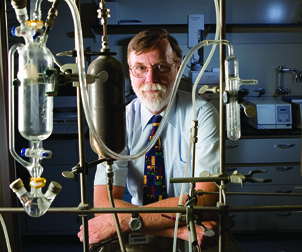Dennis P. Curran to Receive Honorary Doctorate from France’s University of Pierre and Marie Curie
 Dennis P. Curran
Dennis P. CurranIn recognition of a career spanning three decades that includes pioneering contributions to organic chemistry, Pitt chemistry professor Dennis P. Curran is among eight scientists worldwide selected to receive an honorary doctorate from France’s eminent University of Pierre and Marie Curie during a March 26 ceremony at the Sorbonne in Paris. Fellow recipients include one Nobel Prize winner, two researchers from Oxford University, the head of the European Laboratory of Molecular Biology, and the president of the Massachusetts Institute of Technology. The biennial award recognizes eight scientists for their contributions to their fields and dedication to academic values; the Parisian university is known as the leading scientific and medical institution of higher education in France and has conferred about 130 honorary degrees since establishing the award in 1975.
A Distinguished Service and Bayer Professor of Chemistry in Pitt’s School of Arts and Sciences, Curran has written approximately 400 papers, been granted 30 patents, and has had two books published since joining Pitt in 1981. His work revolves around synthetic chemistry, particularly radical and fluorous chemistry. Curran is one of the pioneers of organic radical chemistry, using radical reactions to initiate cascade processes wherein complex molecules are organically produced from simple materials. For example, his lab recently developed a radical synthesis that created several new drugs in the camptothecin class of anticancer agents. One drug, AR-67, is currently in clinical trials for treatment of solid tumors.
Fluorous synthesis allows for faster generation of new chemical compounds. Prior to a reaction, the starting organic molecules are marked with a corresponding series of highly fluorinated tags. The molecules are then mixed and converted over several reactions to new, more complex products. The key feature of Curran’s process is that the fluorous tags allow for the organic compounds to be separated after the reactions, an otherwise arduous process. In the end, a single synthesis yields several pure compounds that would traditionally require separate reactions to produce. Curran founded the company Fluorous Technologies Inc. 10 years ago to develop fluorous products; the Pittsburgh-based company now has approximately 10 full-time employees.
Curran has received, among other awards, the Blaise Pascal International Research Chair, which goes to renowned foreign researchers and is awarded by the regional government of Ile-de-France (metro Paris). In 2009, he joined 162 scientists in the inaugural class of American Chemical Society Fellows. Curran received his bachelor’s degree in chemistry from Boston College in 1975 and earned his PhD from the University of Rochester in 1979. He completed his postdoctoral studies at the University of Wisconsin at Madison in 1981.
More information on Curran’s research is available on his Pitt laboratory Web site.
Other Stories From This Issue
On the Freedom Road

Follow a group of Pitt students on the Returning to the Roots of Civil Rights bus tour, a nine-day, 2,300-mile journey crisscrossing five states.
Day 1: The Awakening
Day 2: Deep Impressions
Day 3: Music, Montgomery, and More
Day 4: Looking Back, Looking Forward
Day 5: Learning to Remember
Day 6: The Mountaintop
Day 7: Slavery and Beyond
Day 8: Lessons to Bring Home
Day 9: Final Lessons

